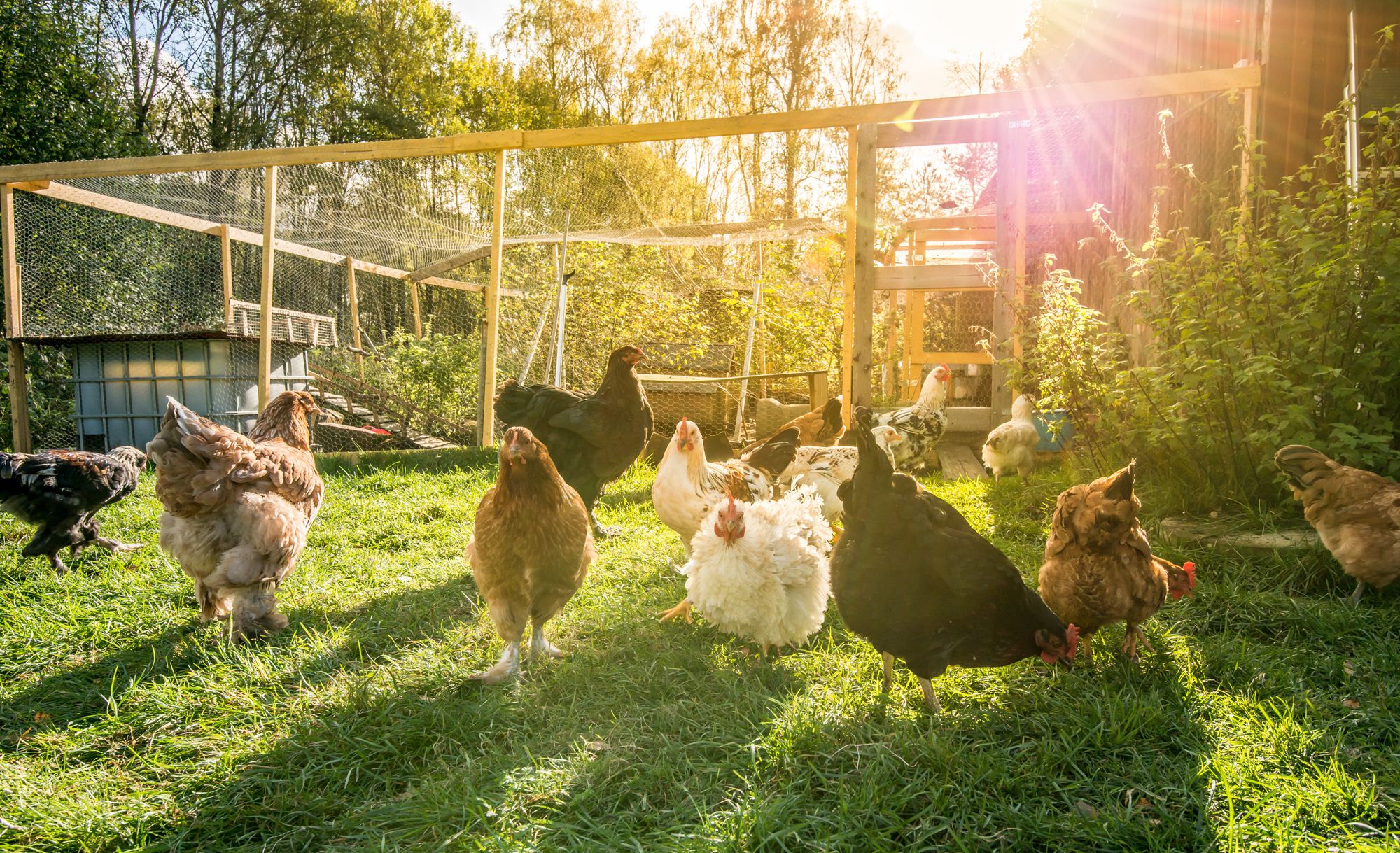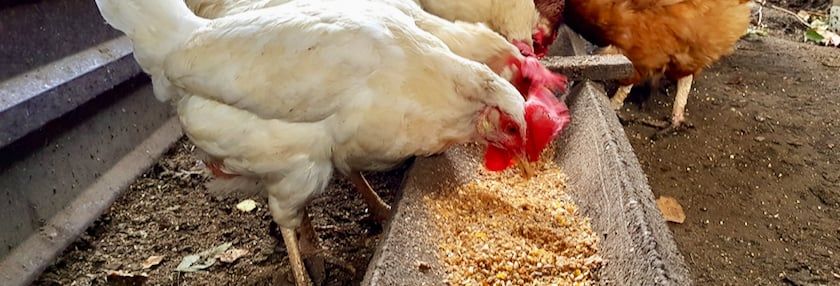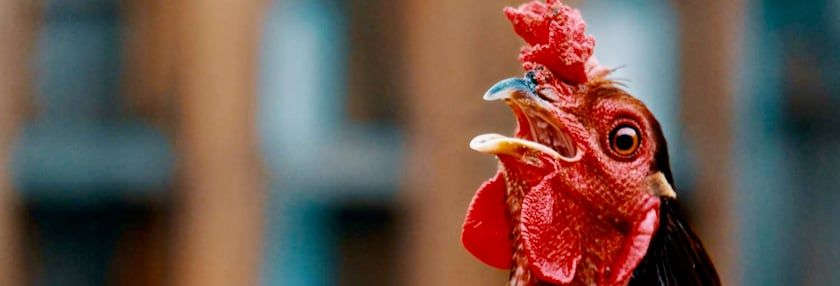The Need for Feed Choices
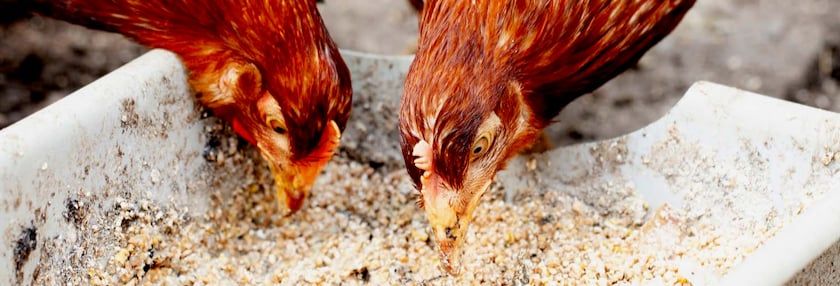

Replacing in-feed drugs with bioactive plant-based additives (botanicals)
Almost every retail feed manufacturer offers a medicated chick starter with the coccidiostat drug amprolium—it is one of the only FDA-approved prophylactic drugs for egg layers, it has some effectiveness, and it is relatively safe. But there are several reasons that medicated feed might not be the best choice for your family’s birds. These include potentially limited efficacy, drug residues in meat and eggs, and the development of drug resistance.
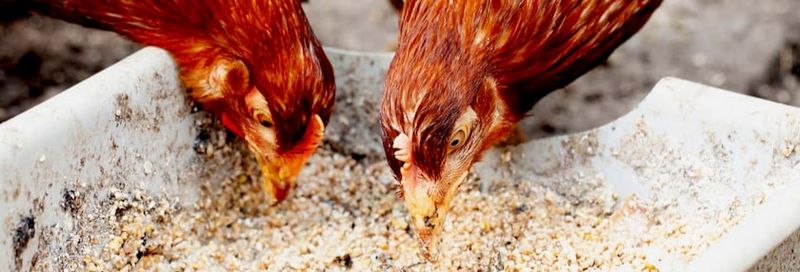
What exactly is coccidiosis?
Coccidiosis is a potentially devastating parasitic disease caused by protozoa of the genus Eimeria. Clinical infection is marked by extensive damage to the intestines, bloody droppings, visibly sick birds and eventually death.
Nine Eimeria species of are known to infect chickens, with three responsible for most clinical infections (Eimeria acervulina being the most common): E. acervulina, E. maxima, and E. tenella.
Potentially limited efficacy
A study conducted at the University of Georgia demonstrated that amprolium was effective against E. tenella, “but only partly effective against E. acervulina.”
Let that sink in—only partly effective against the most common cause of disease. Additionally, researchers from the UK’s Central Veterinary Laboratory, Weybridge, determined that “Chicks infected with Eimeria maxima and Eimeria acervulina were not protected by normal levels of amprolium.”
Effectiveness can be further limited by excess dietary thiamine. Amprolium is a thiamine antagonist which means it acts on Eimeria by blocking thiamine uptake which interferes with carbohydrate metabolism.
Too much thiamine reduces amprolium effectiveness, and too much amprolium inhibits thiamine uptake by the bird.
Drug residues in meat and eggs
Amprolium is absorbed from the intestine and can eventually make its way into meat and eggs. When added to feed at an approved level, amprolium residues are minor enough that the FDA says there is no withdrawal time necessary. But the number is not zero and many people may not want to consume food that contains pharmaceutical residues.
Development of drug resistance
Commercial poultry operations almost never feed a single drug like amprolium repeatedly. Instead, shuttle and rotation programs are used—Eimeria are notorious for developing resistance to just about every coccidiostat we throw at them. If we attack Eimeria with different drugs that have unique modes of action it is much more difficult to defend against.
A shuttle program uses two or more drugs during the grow-out of a single flock. Shuttles may even be part of a rotation in which different classes of cocci drugs or shuttles are rotated one after another.
Medicated feed is more expensive, but we are also likely continuing to feed a drug that interferes with thiamine absorption, and may not be highly effective against the most common cause of coccidiosis. Plus, drug resistance may have developed over years of feeding the same drug continuously.
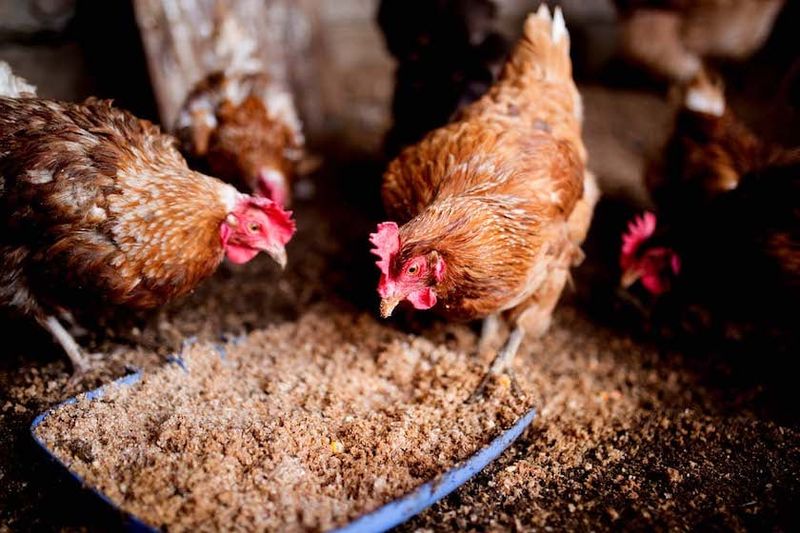
What about other tools?
Botanical extracts and essential oils are some of the best tools that we have to support gut health and wellness in poultry.
Extracts and essential oils are comprised of dozens of bioactive constituents or phytonutrients. (For a more in-depth explanation take a look at the article written by Dr. Jessica Fox in the Winter 2019 issue of Chicken Whisperer Magazine, “Oregano, Essential Oils, and Phytonutrients… OH MY—Understanding plant-based additives and their use”.)
Oregano essential oil has been extensively researched. Oregano exhibits direct anticoccidial properties—it disrupts intracellular metabolism, causing cell leakage. Two major phytonutrient constituents, carvacrol and thymol indirectly support the chick’s immune and antioxidant defense systems.
One theory holds that intestinal lesions arise in part due to generating free radicals (unstable atoms). Oregano (and other herbal essential oils or extracts) may minimize the negative effects of coccidiosis.
Several other phytonutrient-containing botanicals such as garlic, ginger, and citrus peel have been shown to be effective against coccidiosis, primarily by increasing cell membrane permeability and relieving oxidative stress—in short, they scavenge free radicals.
Saponins: a unique class
In addition to molecules like carvacrol and thymol found in oregano, saponins represent another diverse class of phytonutrients with anticoccidial properties. Saponins were originally used in soap-making due to their foaming properties—hence, saponin-containing plants like soapbark, soapwort, and soaproot.)
The French company Nor-Feed evaluated more than 2,000 saponin-containing plants, focusing eventually on fenugreek and yucca. Fenugreek contains 11 distinct saponins and Yucca schidigera contains 15 that are particularly effective against protozoa.
This diversity of saponins is what prevents adaptation by Eimeria species and helps to avoid the development of resistance.
Rather than disrupting cellular metabolism like oregano, these saponins rip apart the Eimeria cell membrane
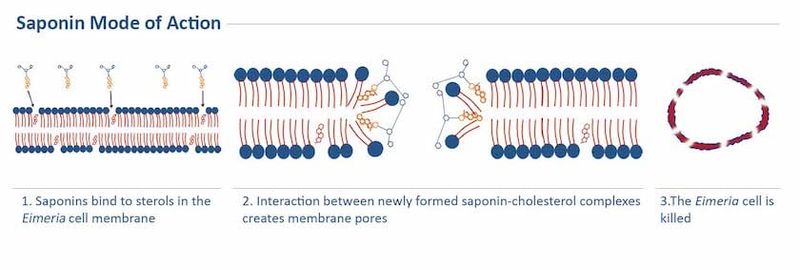
Instead of one molecule to adapt to or defend against, the parasite faces an onslaught of over 25 different active constituents. It’s nearly impossible for Eimeria species to develop resistance against so many assailants at once.
In fact, yucca and fenugreek saponins are as effective as coccidiostat drugs in improving livability and maintaining feed intake and growth. Plus, due to their unique mode of action, they don’t replace oregano and other botanicals; they are complimentary.
Phytonutrient standardization is key
In her 2019 article, Dr. Fox mentioned that an essential oil can differ in its phytonutrient profile from one product to another, depending on where the plant was grown, the weather that the plant was subjected to, or the distillation or extraction process employed.
For consistent results, look for those that are standardized in the levels of key phytonutrients. For example, an oregano product may be standardized to contain a minimum guaranteed level of carvacrol or a garlic product may be standardized in allicin.
When you read an ingredient list, it’s important to ask your feed company if their botanical feed additives and essential oils are standardized and if they are backed by research.
Ask questions: Investigate the ingredient list to make sure each item is there for a reason and not just “window dressing”.
What about vaccination?
If you’re comfortable with vaccines and can have your chicks vaccinated at the hatchery, go for it—cost is minimal and proven to be effective.
All vaccines stress the bird’s immune system to some extent, making it important to lay the foundation of good gut health, immunity, and overall health for your birds to overcome any challenge.
Will vaccination be compatible with other coccidiosis control measures? A study at North Carolina State University determined that a blend of essential oils did not interfere with the effectiveness of cocci vaccine in young broilers. The products evaluated didn’t improve performance, but that’s not to say that they wouldn’t have provided measurable benefits in the face of other challenges such as those caused by pathogenic bacteria or heat stress.
Are we talking antibiotic replacement?
This article is not bashing veterinary drugs. No program is 100% effective—medicated or not— and we will always require veterinary medicine from time to time.
Let’s work towards a foundation of good health and prevention and only treat a problem when necessary. Poultry producers have shown this is possible on a global scale, particularly Europe. The percentage of NAE or “No Antibiotics Ever” feed in U.S. poultry industry is growing rapidly.
Nutritionists and veterinarians know how to use natural alternatives effectively. A growing body of research supports the use of botanicals, essential oils, and plant extracts in poultry diets to improve health, livability, and performance.
Science says it’s a better way for you, your family, and your birds.
Tags:Feed 4 Thought

Chicken Whisperer is part of the Catalyst Communications Network publication family.








